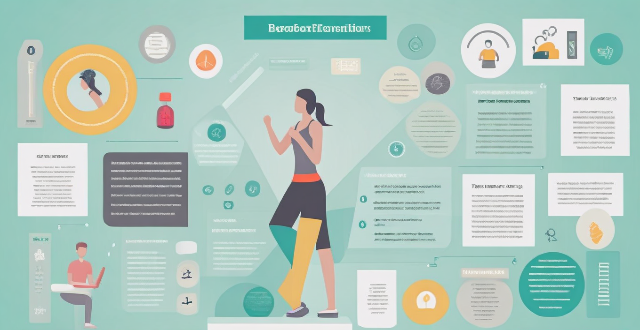Instructor Member

What is the role of a fitness instructor in a gym ?
A fitness instructor is responsible for guiding and motivating gym members to achieve their fitness goals. Their roles include designing customized workout plans, providing personal training sessions, leading group fitness classes, educating members on health and fitness topics, and maintaining a clean and safe environment. The ultimate goal of a fitness instructor is to help members reach their fitness objectives and improve their overall health and well-being.

What kind of training does a fitness instructor need ?
To become a fitness instructor, one needs a high school diploma or equivalent, certification programs like Certified Fitness Instructor (CFI), specialized certifications, practical skills in anatomy, physiology, first aid, teaching and communication. Continuing education is important to stay updated with trends and research. Personal qualities such as passion for health, patience, empathy, leadership, and motivational skills are crucial. Business and marketing skills including client relations management and social media presence are also necessary.

Can I take online fitness instructor courses ?
Yes, you can definitely take online fitness instructor courses. In fact, there are many reputable organizations that offer online certification programs for aspiring fitness instructors. Here are some key points to consider: ## Benefits of Online Fitness Instructor Courses 1. **Flexibility**: Online courses allow you to learn at your own pace and on your own schedule. This is especially beneficial for those who have other commitments such as work or family responsibilities. 2. **Cost-effective**: Online courses are often more affordable than traditional in-person training programs. You can save money on travel expenses and accommodation costs. 3. **Wide range of options**: There are numerous online fitness instructor courses available, covering various areas of expertise such as yoga, Pilates, strength training, and more. 4. **Access to expert trainers**: Many online courses are taught by experienced and certified fitness professionals who share their knowledge and expertise through video lectures, interactive quizzes, and practical assignments. 5. **Continuous learning**: Online courses provide an opportunity for continuous learning and development. You can revisit the course materials anytime and stay up-to-date with the latest trends and techniques in the fitness industry. 6. **Career advancement**: Completing an online fitness instructor course can enhance your resume and open up new career opportunities within the fitness industry. ## How to Choose an Online Fitness Instructor Course When selecting an online fitness instructor course, consider the following factors: - **Accreditation**: Ensure that the course is accredited by a reputable organization or institution. This will ensure that the program meets industry standards and provides valuable credentials upon completion. - **Course content**: Check the course outline and make sure it covers all the necessary topics related to fitness instruction, including anatomy, physiology, exercise techniques, programming, and safety guidelines. - **Instructor qualifications**: Look for courses taught by experienced and certified fitness professionals who have a proven track record in the industry. - **Learning resources**: Ensure that the course provides access to high-quality learning resources such as video lectures, e-books, practice exercises, and interactive quizzes. - **Support and feedback**: Choose a course that offers regular support and feedback from instructors or mentors throughout the program. - **Community engagement**: Look for courses that provide opportunities for engagement with other students and fitness professionals through forums, discussion groups, or social media platforms. - **Pricing**: Compare the pricing of different online fitness instructor courses and choose one that fits your budget while offering quality education and resources.

How do I choose the right fitness instructor course for me ?
Choosing the right fitness instructor course is crucial for your career development and personal growth in the fitness industry. Before diving into course selection, clarify your objectives and research courses that offer the training and certifications you require. Consider factors such as accreditation and certification, curriculum and content, instructor qualifications, reviews and testimonials, cost and duration, hands-on experience, location and accessibility, support system, and alignment with personal values. Finally, trust your instincts and choose the course that feels right for you.

What are the latest trends in fitness instructor courses ?
The latest trends in fitness instructor courses include virtual training, functional training, group training, and mindfulness and wellness. Virtual training has become more popular due to the pandemic, with a focus on creating engaging online workouts and using technology to enhance the training experience. Functional training emphasizes overall physical function through multi-joint movements and balance, coordination, and flexibility exercises. Group training offers high-intensity interval training (HIIT) sessions, small group personal training, and team-building exercises. Mindfulness and wellness practices are being integrated into workouts, with guidance on stress management and mental health provided by fitness instructors. These trends reflect the evolving needs of clients and the importance of overall wellness in achieving fitness goals.

What is the difference between a personal trainer and a fitness instructor ?
The article discusses the differences between a personal trainer and a fitness instructor. Personal trainers design customized workout plans for individual clients, while fitness instructors lead group exercise classes. Personal trainers require certification from accredited organizations like NASM or ACE, while fitness instructors need certification from reputable organizations like AFAA or IDEA. Personal trainers often work in private settings with one-on-one clients, while fitness instructors typically work in public settings leading group classes. Both professions require dedication and continuous learning to stay up-to-date with the latest trends and techniques in the fitness industry.

How can I improve my teaching skills as a fitness instructor ?
This article provides tips on how to improve teaching skills as a fitness instructor. It suggests developing knowledge of fitness and exercise science, enhancing communication skills, creating engaging workouts, and continuously evaluating and improving teaching methods. The article emphasizes the importance of staying up-to-date with current research and best practices, practicing active listening and empathy, designing well-rounded fitness programs, fostering a supportive community within classes, seeking feedback from clients, and reflecting on one's own performance. By following these tips, fitness instructors can provide higher quality service to their clients and achieve better client outcomes.

How much does a fitness instructor course cost ?
The cost of a fitness instructor course can vary depending on the type of certification, location, duration, and extra costs. It is important to research all potential costs before making a decision to ensure that the course fits both your budget and career goals.

How do I become a certified fitness instructor ?
To become a certified fitness instructor, you need toTo become a certified fitness instructor, you need to pass a certification exam, participate participate in continuing education, gain experience, build a network, consider specialization, and adhere to ethical standards.

What are the benefits of becoming a fitness instructor ?
Becoming a fitness instructor offers numerous benefits, including improved physical health, opportunities for personal growth, flexible schedules, job satisfaction, and potential for career advancement.

What certifications should I get as a fitness instructor ?
To become a certified fitness instructor, it's crucial to obtain essential certifications like CPR/AED, personal training, group fitness instruction, and specialty areas of interest. Participating in continuing education will help you stay current and relevant in your field.

What skills do I need to be a successful fitness instructor ?
Successful fitness instructors need a blend of knowledge, communication skills, motivational abilities, physical prowess, and safety awareness to guide clients effectively towards their fitness goals. Key areas include understanding anatomy for safe workout design, obtaining certification and continuing education, demonstrating strong interpersonal and communication skills, keeping clients motivated with positive reinforcement, creating customized workout plans, maintaining personal fitness for credibility, and being prepared for emergencies with first aid knowledge.

How long does it take to complete a fitness instructor course ?
The duration of a fitness instructor course can vary depending on the type of certification, intensity of the program, and level of experience. Basic personal training certification may take 6-8 weeks, while advanced sports nutrition certification may take up to 6 months. Programs may offer full-time or part-time options, and the level of experience of the individual can also impact the duration. It is important to choose a program that aligns with your goals and schedule.

Can anyone try kitesurfing or is it only for professionals ?
Kite surfing, or kiteboarding, is a water sport that combines elements of windsurfing, surfing, paragliding, and gymnastics. It involves using a kite to be propelled by the wind on or over water. While it does take some skill and training to master, anyone who is physically fit and comfortable in the water can learn to kite surf. However, it should always be learned under the guidance of an experienced instructor due to the potential risks involved. To learn kite surfing, one needs to be physically fit, have a good level of swimming skills, understand wind and water conditions, have proper equipment, and take lessons from a certified instructor. Safety precautions such as learning from a qualified instructor, wearing proper safety gear, checking weather conditions, staying away from crowded areas, and knowing one's limitations are also important. In conclusion, while kite surfing may seem like a sport reserved for professionals, anyone can try it with proper training, equipment, and safety precautions.

What are the best fitness instructor courses available ?
This article provides an overview of the best fitness instructor courses available, including certifications offered by the National Academy of Sports Medicine (NASM), American College of Sports Medicine (ACSM), International Sports Sciences Association (ISSA), Aerobics and Fitness Association of America (AFAA), and Yoga Alliance. The duration, cost, and accreditation of each course are also discussed.

How can I ensure equal participation from all members in a study group ?
Ensuring equal participation in a study group is crucial for its success. Here's a summary of strategies to encourage active involvement from all members: 1. **Set Clear Expectations**: Establish guidelines for attendance, engagement, and task completion at the start. 2. **Assign Roles and Responsibilities**: Give each member a specific job to ensure they have an active role. 3. **Encourage Open Communication**: Create a safe space where everyone can share their thoughts without interruptions. 4. **Use Icebreakers and Group Activities**: These help build rapport and encourage shy members to participate. 5. **Provide Feedback and Recognition**: Regularly acknowledge contributions and offer constructive feedback to foster improvement. By implementing these strategies, you can create an inclusive environment that values each member's input, ensuring a productive and enriching study group experience for all.

Can I share my Apple Music subscription with family members using my Apple ID ?
Can I Share My Apple Music Subscription with Family Members Using My Apple ID? You can share your Apple Music subscription with family members using your Apple ID through the Apple Music Family Plan. This plan allows up to six people to enjoy all the benefits of an individual subscription for a discounted monthly rate. To share your subscription, you need to subscribe to the Family Plan and invite family members to join your plan. Once they accept the invitation, they can start enjoying all the benefits of Apple Music, including access to millions of songs, playlists, and more. Sharing your subscription with family members saves money compared to purchasing individual subscriptions for each person.

How does Family Sharing work for content synchronization across multiple Macs and iOS devices ?
Family Sharing allows up to six family members to share content and services across their Macs and iOS devices. This includes music, movies, TV shows, books, apps, and location information. To set up Family Sharing, follow the steps on your iPhone, iPad, iPod touch, Mac, or Apple TV. Once set up, family members can share purchased apps, games, music, movies, TV shows, books, and photos. They can also share their locations using the Find My app. Managing family members and content restrictions is possible through the Family Sharing settings on your device. Overall, Family Sharing makes it easy for families to share content while maintaining control over what content is accessible by each family member.

How can I effectively manage a sports facility ?
Managing a sports facility effectively requires a mix of administrative skills, customer service, and industry knowledge. Key steps include developing a business plan, hiring qualified staff, maintaining cleanliness and safety, offering diverse services, implementing efficient scheduling systems, fostering community building, staying updated with industry trends, focusing on customer service, managing finances wisely, and continuously monitoring performance to make necessary adjustments. Following these guidelines ensures an enjoyable environment for members and the long-term success of the facility.

Can I share my Apple Music subscription with family members ?
The text provides a guide on how to share an Apple Music subscription with family members through the Apple Music Family Plan. This plan allows up to six people to enjoy all the features of Apple Music for a single monthly fee. The steps include subscribing to the Family Plan, inviting family members, accepting the invitation, and enjoying Apple Music together. The benefits of the plan include separate accounts, simultaneous use, personalized experience, offline downloads, and access to other Apple services. Sharing the subscription saves money and creates a shared musical experience within the household.

Can family members of different ages and fitness levels do the same home workout ?
The question of whether family members of different ages and fitness levels can engage in the same home workout is a pertinent one, especially considering the numerous health benefits associated with regular exercise. The positive effects of physical activity on longevity and disease prevention are well-documented At the core of this inquiry lies the understanding that exercise, regardless of its form, be it running or weight lifting, significantly contributes to a longer and healthier life. Given the myriad benefits of regular physical activity, families are often inclined to incorporate workout routines into their daily lives. However, the variance in age and fitness levels among family members presents certain challenges and considerations:

How can families make time for both sports and quality family time ?
In today's fast-paced world, finding a balance between work, personal interests, and family time can be challenging. For families with members who are passionate about sports, integrating quality family time and sports activities requires careful planning and a commitment to making the most of every moment together. Here's how families can make time for both sports and quality family time: ### **Prioritize and Plan** #### _Set Clear Priorities_ - Discuss as a family what each member values most in terms of sports and family time. - Agree on a set of priorities that everyone can commit to. #### _Create a Shared Calendar_ - Use a family calendar to schedule sports practices, games, and family activities. - Make sure everyone has access to the calendar and updates it regularly. ### **Integrate Sports into Family Time** #### _Attend Sports Events Together_ - Make attending sports games or practices a family outing. - Cheer on the athlete together, making it a shared experience. #### _Play Sports as a Family_ - Engage in sports activities that everyone enjoys, such as bike rides, hikes, or backyard games. - Encourage non-athletic family members to participate in ways that suit their interests and abilities. ### **Quality Over Quantity** #### _Make Every Moment Count_ - Even short periods of time can be meaningful if everyone is fully engaged. - Turn off distractions like phones and TVs to focus on each other. #### _Regular Family Meetings_ - Hold regular family meetings to discuss schedules, concerns, and plans. - Use this time to reinforce the importance of both sports and family time. ### **Flexibility and Adaptability** #### _Be Open to Change_ - Recognize that unforeseen events may require adjustments to plans. - Maintain a flexible attitude to accommodate changes without stress. #### _Communicate Openly_ - Encourage open communication about feelings and scheduling conflicts. - Address any issues promptly to avoid resentment or burnout. ### **Support and Encouragement** #### _Encourage Each Other_ - Support family members in their sports endeavors and recognize their efforts. - Acknowledge the sacrifices made by non-participating family members. #### _Celebrate Achievements Together_ - Celebrate sports achievements as a family, no matter how big or small. - Create traditions around these celebrations to strengthen family bonds. ### **Conclusion** By prioritizing, planning, integrating sports into family time, focusing on quality interactions, being flexible, and providing support, families can successfully make time for both sports and quality family time. It's all about finding the right balance that works for your unique family dynamics and embracing the enriching experiences that both realms offer.

How do successful sports leaders motivate their team members ?
Successful sports leaders motivate their teams through clear objectives, positive reinforcement, encouragement, leading by example, communication, building team spirit, continuous development, resilience, and celebrating achievements.

How long does it take to learn how to swim ?
The time it takes to learn how to swim varies depending on age, natural ability, practice frequency, and instruction quality. Children generally learn faster than adults due to their curiosity and flexibility. Consistent practice is crucial for developing muscle memory, and having a qualified instructor can significantly impact the learning curve. Tips for faster progress include setting realistic goals, staying positive, practicing breath control, focusing on technique, and being patient. With dedication and the right approach, anyone can learn to swim effectively.

What are some common mistakes people make when learning to swim ?
When learning to swim, common mistakes include forgetting to breathe properly, tensing up too much, not using proper technique, and overestimating abilities. To avoid these mistakes, focus on deep breathing exercises, relaxing your body, seeking guidance from a qualified instructor, and staying within your comfort zone. With patience, practice, and proper technique, beginners can improve their skills and enjoy a safer and more enjoyable swimming experience.

What are the best sports careers for someone who loves competition ?
Competitive individuals have various sports career options, including professional athlete, coach/manager, sports analyst/journalist, referee/umpire, personal trainer/fitness instructor, sports agent/manager, and event planner/promoter. Each path offers unique opportunities to thrive on competition and excel in the sporting world.

How do I overcome my fear of water and learn to swim ?
Overcoming a fear of water and learning to swim is a process that requires patience, persistence, and the right approach. Here's how you can do it: identify the source of your fear, gradually expose yourself to water, find a supportive instructor, start with basics in shallow water, progress slowly, use relaxation techniques, set realistic goals, celebrate small victories, join a swimming group or class, and always prioritize safety.

How long does it take to master a yoga pose ?
Mastering a yoga pose requires time, dedication, and patience. Factors affecting the timeline include physical fitness level, practice frequency, quality of instruction, individual body type, and mindset. The time it takes to master a pose varies greatly, but generally, beginner poses can be mastered within weeks to months, intermediate poses within months to a year, and advanced poses may take years. Tips for mastering a yoga pose include starting with the basics, focusing on alignment, practicing mindfully, staying patient and persistent, incorporating variety, seeking feedback, and maintaining a holistic approach.

How do I learn to swim ?
Learning to swim requires patience, practice, and perseverance. Here are some tips to help you get started: 1. Find a suitable location: Look for a pool or body of water that is safe and accessible. 2. Get the right gear: Invest in a good quality swimsuit, goggles, and swim cap. 3. Start with basic techniques: Begin by learning basic techniques such as floating, kicking, and breathing. 4. Take lessons: Consider taking lessons from a qualified instructor who can teach you proper techniques and provide feedback on your progress. 5. Practice regularly: Consistency is key when learning any new skill, including swimming. Set aside regular time each week to practice your swimming skills. 6. Stay safe: Always prioritize safety when swimming. Never swim alone, and always follow pool rules and regulations.

What is the outlook for the European Union's economic recovery ?
The economic recovery of the European Union (EU) depends on political stability, global economic conditions, and domestic policies. Unity among member states and effective governance are crucial for managing crises and implementing growth-promoting policies. Global trade dynamics and supply chain disruptions also play a significant role. Domestically, fiscal stimulus, structural reforms, and a balanced green transition are key. The outlook is optimistic but uncertain, with many influencing factors.